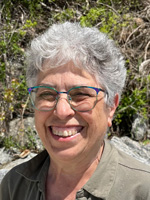Barbara L. Rosenthal, MD, FAAFP, DFASAM
Regional Director
Region III - Connecticut, Maine, Massachusetts, New Hampshire, Rhode Island, Vermont
 Barbara L. Rosenthal, MD, FAAFP, DFASAM. Born in NYC, I have lived and practiced in Maine and Vermont, as well as Wisconsin and NY. When not practicing Medicine, I enjoy my granddaughter, music, my clay practice and the beauty of the outdoors. As a board-certified family physician since 1986, I became board certified in Addiction Medicine by ABPM through the clinical pathway and have earned the designation of Distinguished Fellow of ASAM.
Barbara L. Rosenthal, MD, FAAFP, DFASAM. Born in NYC, I have lived and practiced in Maine and Vermont, as well as Wisconsin and NY. When not practicing Medicine, I enjoy my granddaughter, music, my clay practice and the beauty of the outdoors. As a board-certified family physician since 1986, I became board certified in Addiction Medicine by ABPM through the clinical pathway and have earned the designation of Distinguished Fellow of ASAM.
Prior to practicing medicine, I obtained a degree in Agriculture and worked on a Dairy farm, which has helped provide a unique lens on rural characteristics and health needs. As the opiate crisis manifested itself I added treatment of Substance Use Disorders, which I now practice primarily. Other ares of expertise include the use of acupuncture, and the non-opiate treatment of acute and chronic pain. We serve this those whose lives have been touched by substance use disorders, providing a SUD-forward approach to primary care.
As a National Health Service Corps Scholarship recipient, I began practicing in rural Wisconsin both at a Migrant Health Center and in an isolated comprehensive family practice, where I both honed my clinical skills and became involved in rural and public health issues. During that time, I spearheaded development of a camp-based Women’s Health Program serving migrant families, while also developing a brick and mortar center for Women’s Health. Joining a small HMO after moving Vermont, I continued Rural Family Practice. I was able to develop strong advocacy skills in my practice through national committee work for the AAFP and advocating for individuals under the direction of a trained advocate. Currently I work with the Johnson Health Center (A3-B) in northern Vermont and with the Greylock recovery center in Northern Berkshire County serving the NY/VT/MA tristate area.
Between education in Upstate NY, residency in Maine, repayment of my NHSC (National Health Service Scholarship) in Rural Wisconsin, and subsequent practices in Mass, VT and NY (sometimes simultaneously), I have been exposed to practice issues in a variety of settings and understand both their unique qualities and the commonalities involved. I would bring an understanding at a granular level of strengths and weaknesses in current systems as well as a unique rural perspective. In addition to clinical practice, my focus is on Health Policy as it pertains to both the medical and the social determinants of health, particularly for the under-resourced in rural and other populations.
With a long record of professionalism, integrity, leadership and service (local, state and nationally), I have demonstrated both sustained competence and commitment to the field of addiction medicine. I have served on a wide variety of task forces, committees and organizations.
